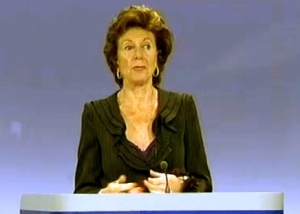Europe cracks whip over 'exorbitant' data-roaming fees

European regulators are losing patience with the gap between the charges levied for using mobile data abroad and the actual costs of supplying that service, digital agenda commissioner Neelie Kroes has warned mobile operators.
Kroes was speaking on Thursday at the annual conference of European Telecommunications Network Operators Association (ETNO). Her predecessor, Viviane Reding, successfully forced through drastic cuts in voice-roaming charges. These went some way towards lowering the cost of data roaming, and the current wholesale price cap is €0.80 (68p) per megabyte. However, the caps Reding imposed are up for review next year.

Neelie Kroes, pictured at an EU conference in May, wants "the gap between roaming and domestic prices to approach zero".
Referring to the cost of data roaming within the EU as "exorbitant" and "an outdated concept", Kroes said she would retain an open mind for a "while longer" about what the European Commission's next steps would be. However, those steps would not involve "endless tweaking" of the current price-capping arrangement without adding anything new, she promised.
"I want the gap between roaming and domestic prices to approach zero," Kroes said. "The sooner the better. Significant differences between roaming charges and national tariffs cannot be justified in a true single market. The present financial and economic situation in the EU does not give us much room and time to postpone the creation of a well-functioning telecom and digital internal market."
Kroes and the Commission are eagerly pursuing a European single market in information technology and communications through the Commission's Digital Agenda, introduced in May.
"A true single market is one where the price differences between voice, SMS and data relate only to the actual cost of providing these different services," the commissioner said on Thursday.
"In the future, when all transmission in networks is data, the different approaches we see to pricing for these different services should logically converge. In such a market, costs will indeed go down, but the opportunities for innovation and new business models will grow," she added.
Kroes noted that Belgian politician Vincent Van Quickenborne had proposed an outright ban on roaming charges within Europe on 4G networks, as soon as those networks go live.
"Minister Q, as I like to call him, has noted that mobile downloading abroad costs a Belgian subscriber almost 30 times more than at home," she said. "I think we can all agree that such pricing examples bear little relation to the true cost of supplying the service."
While the European rules are now in place to alleviate data-roaming 'bill shock', where consumers receive a bill for an amount far higher than they were expecting, it is still possible to run up charges of thousands of pounds. In March, a UK student reportedly ran up a bill of around £8,000 for using data in France, for example.
Vodafone said in a statement that it supports the lowering of data-roaming rates, but fell short of backing the idea of reducing the cost gap to zero.
"Vodafone led the market with the introduction of its Passport voice roaming service in 2005, which now has 27 million users, and we continue to lower the price for customers using their phones for data and email when travelling abroad," the company said.
3, the smallest UK operator, was more explicitly supportive of Kroes's warning. "Mobile data-roaming charges remain shockingly high," the company told ZDNet UK in a statement. "As smartphone and mobile broadband use has exploded, travelling consumers are increasingly exposed to charges 100 times greater than they pay at home."
"The root of this is excessive wholesale pricing. The Commission should take decisive action to bring down these prices," it added.
None of the other UK operators had responded to a request for comment at the time of writing.